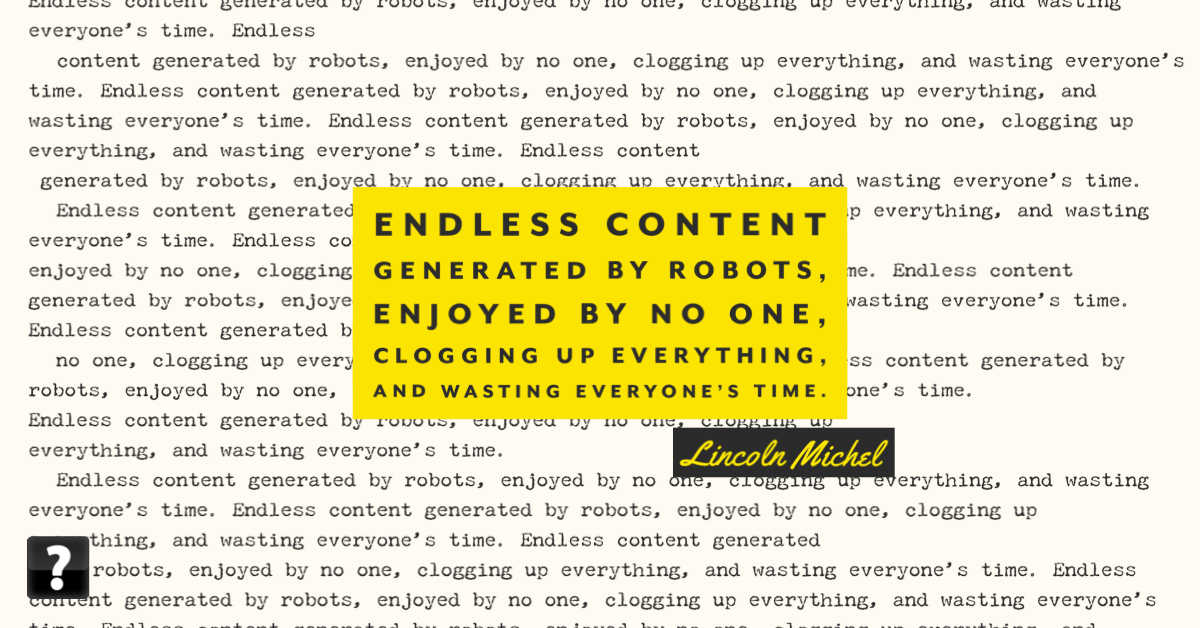A.I. can write book reviews no one reads of A.I. novels no one buys, generate playlists no one listens to of A.I. songs no one hears, and create A.I. images no one looks at for websites no one visits.
This seems to be the future A.I. promises. Endless content generated by robots, enjoyed by no one, clogging up everything, and wasting everyone’s time.
Lincoln Michel, in The Year that A.I Came for Culture [newreplublic.com], published in The New Republic
Will A.I. turn the internet into a virtual version of the Earth in Wall-E? Abandoned under so much garbage we have to evacuate? Some army of little A.I.’s left behind to cleanup the shit —to correct the hallucinations, remove the copyright infringing generated images and text?
Maybe not. 2023 was the year of A.I.. It’s been building for some time, with AI/ML being a term discussed endlessly at work for a few years. But in 2023, with the launch of ChatGPT (actually in November 2022 with GPT 3.5), A.I. went from something on the periphery of everyday life —something you heard about in passing news stories about tech— to an inescapable monster, on the lips of everyone, from tech CEOs to cultural commentators. A.I. managed to hold our collective attention in a way few things can in our hyperactive zeitgeist.
I don’t agree with everything Lincoln Michel discuses in the New Republic article but there was a line that caught my eye:
A.I. costs lots of money, and once investors stop subsidizing its use, A.I.—or at least quality A.I.—may prove cost-prohibitive for most tasks.
This caught my eye because I just read an article by Cory Doctorow the other day in Locus. In Cory Doctorow: What Kind of Bubble is AI [locusmag.com] Doctorow addresses the the same idea, that the cost of A.I. is it’s Achilles heel:
The universe of low-stakes, high-dollar applications for AI is so small that I can’t think of anything that belongs in it.
Basically Doctorow says that A.I. is unlikely to be able to fully replace a human for high-stakes applications —think doctors. A.I. can help speed up the process but do you trust an A.I. to make a life-or-death medical decision without human review? And if the A.I. is augmenting the human and not replacing it the economics don’t seem to work given the cost of running the most advanced A.I. models.
Of course A.I. is still getting better. So maybe in a few years it will get to the point that we all trust it to make life-or-death decisions for us without a “human in the loop”. Maybe people born after the LLM revolution will grow up just trusting A.I. more than those born before.
A.I. researches are looking at how to bring the cost down without sacrificing the quality of their models. Apple is working on models that will run on an iPhone rather than whole data centers. After all, technologies march to shrink it’s size and power consumption while increasing it’s power is incredible:
In 1978, the Cray 1 supercomputer cost $7 Million, weighed 10,500 pounds and had a 115 kilowatt power supply. It was, by far, the fastest computer in the world. The Raspberry Pi costs around $70 (CPU board, case, power supply, SD card), weighs a few ounces, uses a 5 watt power supply and is more than 4.5 times faster than the Cray 1.
Roy Longbottom, in Cray 1 Supercomputer Performance Comparisons With Home Computers Phones and Tablets [roylongbottom.org.uk]
How long will it take today’s data center sized A.I. models to run in my pocket or on my wrist? And by then will the data center sized models be trustworthy enough to handle the high-stakes —fault intolerant—, high-dollar applications?
Who knows. I’ll leave predicting to future to the Sci-Fi authors like Doctorow.
But, I think Doctorow’s point is good; the current hype around A.I. is a bubble. What will be left when it bursts? Will, as Lincoln Michel wonders, A.I. technology plateau as so many other technology promises have, forever just a few years away?
I’m personally skeptical of truly life changing things coming from the current bubble, small incremental improvements, sure, endless annoying low-stakes use cases, absolutely, but truly life changing? I remain skeptical.
Though, the ability for ChatGPT to answer all your homework problems will force education to change, but schools adapted to pocket calculator and then graphing calculators, they will adapt to A.I. bots in the kids pockets too.
It should also be noted that the current hype cycle is over Generative A.I., which is only one branch of A.I.. Some life changing A.I. applications are already out there, like IBM’s A.I. for folding proteins. I think this is the kind of A.I. that will truly change the world in the long run, helping scientists to push medicine forward rather than spitting out clickbate content to game the online advertising world.

